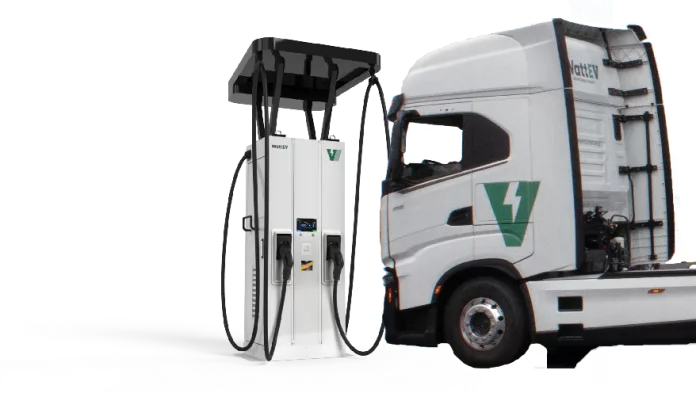WattEV, an innovator in electric truck charging infrastructure, has unveiled its latest charging depot, a pioneering facility based in Bakersfield, California.
Connecting California’s Agricultural Heartland and Warehousing Hubs
The new depot spans a vast 119 acres and is crucially situated to bridge the agricultural breadth of the San Joaquin Valley with California’s bustling seaports and inland destinations. It’s not only owned and operated by WattEV but also distinguished as the first electric truck stop worldwide that harnesses solar power through its microgrid, complemented by an advanced battery energy storage system (BESS). This installation boasts the capacity for rapid megawatt charging, courtesy of its MCS chargers.
Cutting-Edge Charging Facility with Rapid Turnaround
Equipped with an array of 16 dual-cord 360kW chargers and 15 single-cord 240kW CCS chargers, along with three high-speed 1,200kW MCS chargers, this depot reflects the state-of-the-art in charging technology. It is designed to leverage solar energy, thus emphasizing sustainability. WattEV’s CEO, Salim Youssefzadeh, underscores the significance of the MCS chargers, which reduce the charging time to under 30 minutes for up to a 300-mile range, promising a transformational impact on the adoption of electric trucks.
Strategically Positioned for Optimal Access
With its distinctive WattEV branding, the Bakersfield depot is strategically positioned near the influx of transportation routes, CA-99 at CA-65. This allows it to efficiently service electric trucks traversing Middle and Southern California, as well as the broader Western U.S., especially those operating within the substantial agricultural and warehousing sectors.
Depot Amenities for Truck Drivers
Beyond the charging facilities, the depot caters to the needs of truck drivers with amenities such as restrooms and commercial space, which is available for leasing to food and merchandise vendors.
Expanding WattEV’s California Charging Network
WattEV is rapidly extending its footprint across California. Besides the newly functional Bakersfield depot, recent inaugurations include stations at the Port of Long Beach among others. Prospects for future depots all incorporate the facility for MCS charging, with the aim to support the growing electric freight transport network.
Trailblazing the Public-Access Electric Freight Corridors
Diligently working towards greener freight corridors, WattEV is progressing through various stages of developing large-scale solar-powered charging depots that scatter across crucial transit routes, from California to Salem, Oregon, and beyond.
Comprehensive Electrification of Freight Routes
The Bakersfield charging station is a piece of a broader plan of electrifying major freight corridors. Such expansion includes additional depots and interconnecting the most productive agricultural zones to significant ports and urban centers, with a keen eye on Fresno, Stockton, and Oakland.
WattEV’s Innovative Electric Truck-as-a-Service Model
To facilitate the shift to zero-emission transit, WattEV presents a unique Truck-as-a-Service (TaaS) model. This approach offers access to electric trucks with comprehensive support ranging from maintenance to insurance, all at a cost intended to rival that of traditional diesel trucks.
Integrating Zero-Emission Freight Infrastructure
With substantial grant funding support from the California Energy Commission and additional aid from the San Joaquin Valley Air Pollution Control District, the Bakersfield depot epitomizes the concerted effort towards a zero-emission transport landscape. This initiative is pivotal for the achievement of stringent air quality standards while simultaneously fueling economic growth and ensuring public health benefits.
As mobile emissions continue to pose significant environmental challenges, efforts like the Bakersfield charging depot are instrumental in reducing the impact of heavy-duty vehicles on air quality.
Commendations from Regulatory Bodies
Leaders from the Valley Air District and the California Air Resources Board commend WattEV for its strides in eliminating emissions from freight transportation, emphasizing the positive effects the depot will have on air quality and public health. These advancements resonate with the broader goal of creating a healthier environment for all Californians through innovative infrastructure and strategic planning.


























